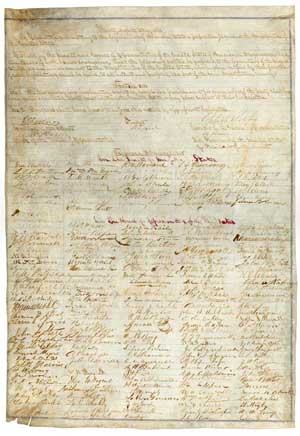  |
| Neither
slavery nor involuntary servitude, except as a punishment for a crime
whereof the party shall have been duly convicted, shall exist within
the United States, or any place subject to their jurisdiction.
Passed by Congress in January 1865 and ratified by three-quarters of the states within a year, the Thirteenth Amendment irrevocably abolished slavery throughout the nation - including those areas in which the Emancipation Proclamation had not applied. The second section empowered Congress to enforce the amendment; some Republicans felt that this authorized Congress to define the rights to which former slaves were entitled. This document is signed by President Abraham Lincoln, who signed several commemorative copies although the U.S. Constitution does not authorize presidents to do so. In addition, this copy carries the signatures of 188 members of the House and Senate, along with Speaker of the House Schuyler Colfax and vice-president Hannibal Hamlin. |
||||
|
Commemorative
Copy of The Thirteenth Amendment
Copyright 2002 The Chicago Historical Society |
||||
|
|
||||

